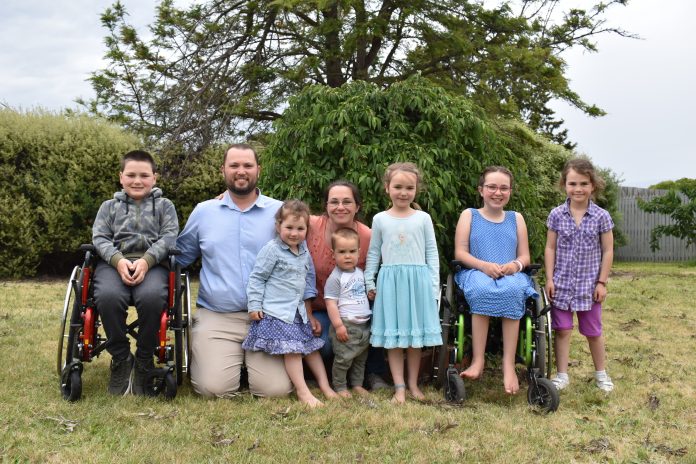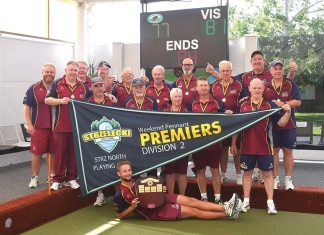Alyssa Fritzlaff
A FUNDRAISER has been launched for a Traralgon family who have had four children diagnosed with a rare genetic condition.
The fundraiser, organised by Stacey Richardson, aims to help the family raise money to buy a new car that can be modified to suit their needs.
The condition the children have, Progressive Pseudo-rheumatoid Dysplasia (PPRD), affects the growth of bones and joints in the body, it causes progressive disability throughout their lifetime.
Parents David and Rosalie met in Sale as teenagers through their Church, and it has always been their ambition to have a large family.
They now have six children, Alyssa, Bradley, Sarah, Claire, Penny and James.
Four of their children were diagnosed with the PPRD in 2020, a diagnosis which took seven years.
Their eldest child Alyssa, a bubbly young girl, enjoyed gymnastic, pony club and hiking.
However, things changed when she started developing a limp around age four.
“When Alyssa was about Penny’s age, she was limping a little bit … we thought she might have broken her foot or had an injury,” Rosalie explained.
“We went to physiotherapists, we tried all sorts of things, and they said this is something that we don’t know, this is bigger – so we just kept going to specialist after specialist.”
Alyssa was unable to get an accurate diagnosis until their second child, Bradley, started developing symptoms.
“The reason that we got the correct diagnosis, is because Bradley was also beginning to show the exact same signs that Alyssa had been showing,” Rosalie said.
“We went to see the genetics teams, and there happened to be a world renowned expert in that team, who happened to have seen this case worldwide… he knew the condition, which was amazing because it’s very rare.”
The condition is so rare that the family have never met anyone who has the condition in person. They have only interacted with others on a worldwide forum.
“There’s an estimate in the UK for one in one million, that’s the best estimate they have,” David said.
“It’s a recessive condition … so statistically, each of our children have a 25 per cent chance of having it. With six kids, you’d think it would be one or two kids by the statistics, but the numbers didn’t fall that way for us.”
The year 2020, while eventful for everyone, was a very big year for the McLaren family. Baby James had just arrived, and after the diagnosis of PPRD for the eldest children, 12-year-old Alyssa stopped walking.
Alyssa and 10-year-old Bradley now use wheelchairs full-time, and four-year-old Penny and 18-month-old James are expected to require wheelchairs in the future.
As the condition progress’ over time the children will require higher levels of support, including support with daily activities such as dressing, bathing and other self-care.
“With this condition, there’s not much that we can do apart from continue therapy to try and maintain their ability, and then replace joints when necessary,” Rosalie explained.
“Alyssa is actually on the waiting list for a double hip replacement, and Penny is on the waiting list to have knee osteotomy.”
David and Rosalie purchased a new car in 2020, however they quickly realised it would not be large enough to fit the amount of wheelchairs that they will eventually need to transport.
According to the National Disability Insurance Scheme (NDIS) “vehicles aged less than five years, under 80,000kms, are generally considered suitable to modify”.
The vehicle identified as most suitable for the family’s growing needs is a long wheel base Mercedes Benz Sprinter.
“There is a limited choice, most vehicles of that style, they’re not built for passengers, they’re built for cargo – courier vans and the like,” David said.
“When we talked to the people who do the modifications and they said that’s really your best bet for what we need.”
This vehicle will be able to be modified by the NDIS to suit the family’s needs.
Additionally, the family have begun planning to build a new home.
“We are trying to prepare to build a house that’s wheelchair friendly,” David explained.
“We are looking at getting plans made up, and building things to a disability standard is a really expensive way of doing things … we’ve got that cost and this car cost as well.”
In a bid to adapt their current home they have installed ramps around the property and moved doorways so that they open outwards.
However, their current home will not be suitable in the future.
“The kids’ needs are going to develop to a point where we need to look at using ceiling hoists, and that requires extra engineering in the walls and in the ceiling to make it stronger,” David said.
“It’s not part of the financial plan, so to speak, but it’s just the way things have fallen – which is just the way life goes.”
After coming to terms with their changing circumstances, and with the encouragement of Stacey Richardson, the couple reached out for help.
“We’ve tried to manage it all ourselves,” David said.
“Unfortunately we’ve had to ask the community for support, and to be honest we’ve been blown away by the amount of support that’s come forward so quickly.”
“We understand that a lot of people have been having a really tough time financially, with COVID … and we are immensely grateful and appreciative,” Rosalie added.
Ms Richardson, has been supporting the family since the children’s diagnosis, and came up with the idea to start the fundraiser.
She has set up the fundraising page, and organised a social media campaign. Ms Richardson is also approaching businesses for assistance with the fundraiser.
The family are extremely grateful for Stacey’s assistance.
“It’s quite incredible what she’s done,” Rosalie said.
The family are incredibly grateful for the help they have received so far, and would like to extend their thanks to the community for their support.
To learn more about the McLaren family’s fundraiser, or to donate, visit: www.mycause.com.au/page/269708/fundraising-for-the-mclaren-family-accessible-vehicle












